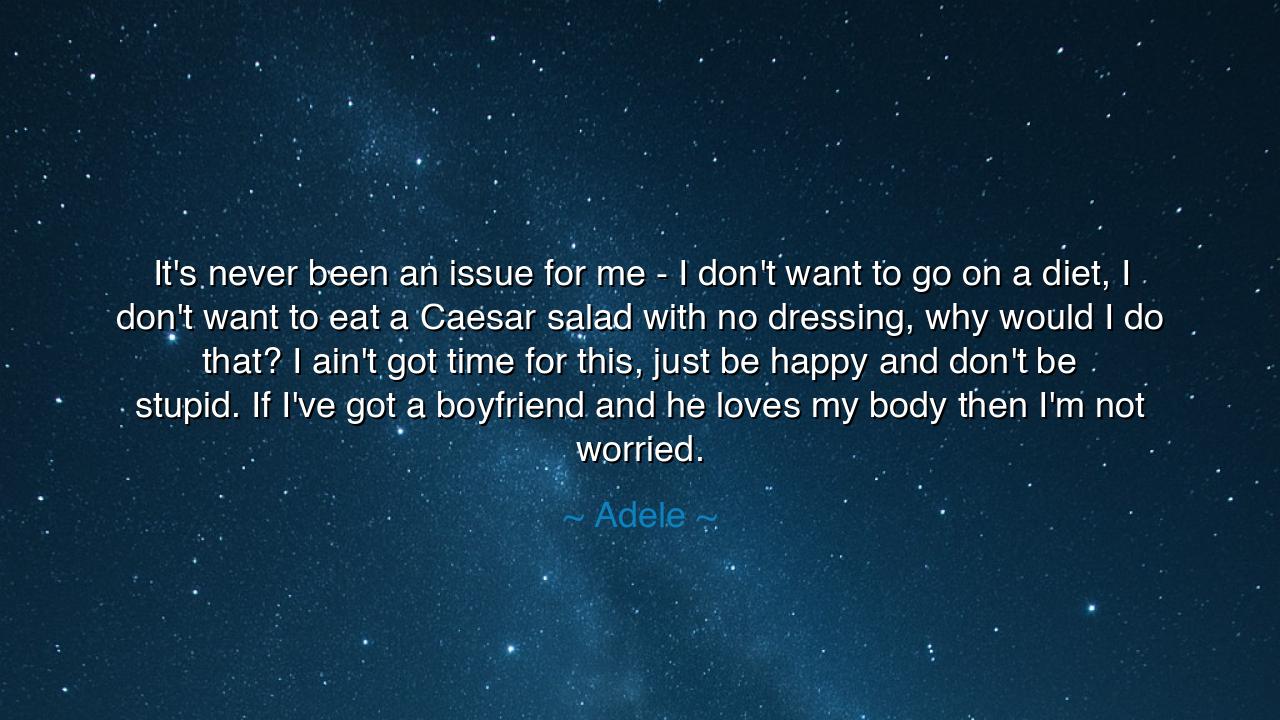
It's never been an issue for me - I don't want to go on a diet, I
It's never been an issue for me - I don't want to go on a diet, I don't want to eat a Caesar salad with no dressing, why would I do that? I ain't got time for this, just be happy and don't be stupid. If I've got a boyfriend and he loves my body then I'm not worried.






In the cacophony of modern life, where the pursuit of perfection often comes at the expense of joy and balance, the words of Adele ring with the clarity of ancient wisdom. “It's never been an issue for me - I don't want to go on a diet, I don't want to eat a Caesar salad with no dressing, why would I do that? I ain't got time for this, just be happy and don't be stupid. If I've got a boyfriend and he loves my body then I'm not worried.” These words, spoken with strength and self-assurance, speak to a profound understanding that true happiness and contentment lie not in the rigid confines of societal expectations, but in the acceptance and celebration of one’s own body.
In ancient times, the great philosophers and warriors knew well the wisdom of self-acceptance. The ancient Greeks, for instance, revered the body not as something to be sculpted into an impossible ideal, but as a vessel to be nurtured and respected. The great philosopher Socrates taught that wisdom lies in understanding oneself, in knowing one’s limits and embracing one’s true nature. Socrates did not seek to conform to the expectations of society but chose to walk a path of self-awareness, constantly questioning and refining his understanding of the world. Like him, Adele rejects the societal pressures of dieting and self-doubt, instead choosing to focus on what brings joy and fulfillment.
The Romans too, with their grandeur and pride, often saw the body as a reflection of virtue, but they were also deeply aware of the dangers of excess and vanity. The great general Julius Caesar was known to have balanced his physical prowess with a sharp mind and a deep understanding of his own humanity. Caesar, though a conqueror, did not seek to conform to the impossible standards set by others but embraced his own image, using it as a tool for his strength. In this, Adele’s attitude is a reflection of that Roman understanding—confidence and acceptance in who one is, without succumbing to the pressure of idealized beauty.
Adele’s words also reflect the ancient understanding that true love and happiness come from within. She declares, “If I’ve got a boyfriend and he loves my body, then I’m not worried.” This echoes the teachings of Epicurus, the ancient philosopher who believed that true pleasure and contentment come not from external approval, but from cultivating a life of peace, simplicity, and self-respect. Epicurus would argue that a person’s worth is not determined by how they are seen by the world but by how they see themselves, and the love that comes from within is the most powerful force for true joy.
Consider, too, the example of the legendary queen Cleopatra, whose beauty and charisma were renowned across the ancient world. Yet, it was not her physical appearance alone that made her powerful—it was her ability to accept and command her own self. She was beloved not because she conformed to a certain image of beauty, but because she embraced her authenticity, her strengths, and her flaws. Like Cleopatra, Adele understands that love and acceptance begin within, and that no external diet or expectation should dictate one’s happiness or self-worth.
The lesson, then, is clear: true happiness lies not in the pursuit of an unattainable ideal, but in the courage to accept oneself fully. To chase after perfection is to miss the beauty in imperfection, to fall into the trap of endless striving without ever feeling fulfilled. Adele’s words remind us that the greatest beauty is found not in a perfect body, but in the joy and confidence with which we embrace who we truly are. The pursuit of self-love and acceptance is the most heroic journey of all.
Thus, as you walk your own path, remember the wisdom of Adele and the ancients: embrace the body you have, not for its perfection, but for its strength, its resilience, and its ability to carry you through life’s trials. Seek happiness not through the fleeting approval of others, but through the unshakable confidence that comes from loving yourself as you are. For in this self-acceptance, we find the greatest freedom—freedom from the weight of societal pressures and the joy of living authentically.






AAdministratorAdministrator
Welcome, honored guests. Please leave a comment, we will respond soon